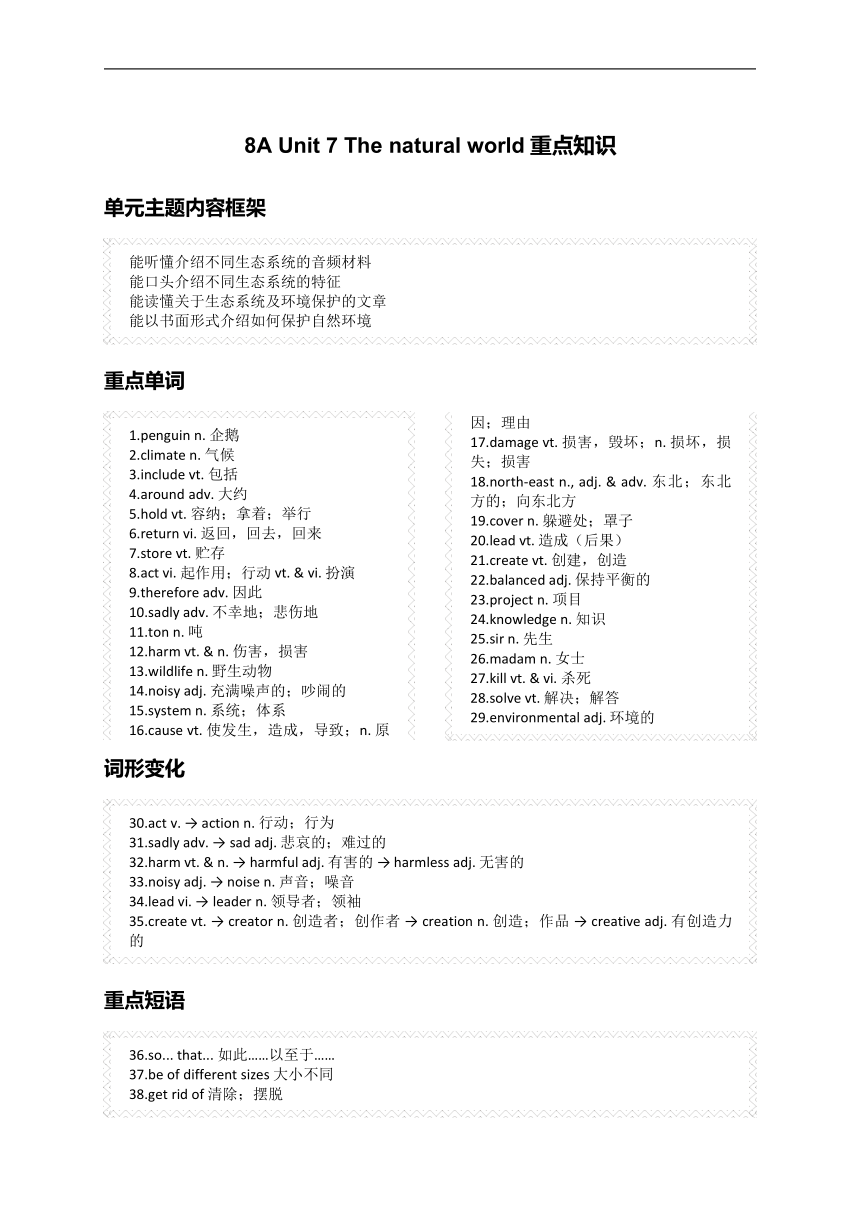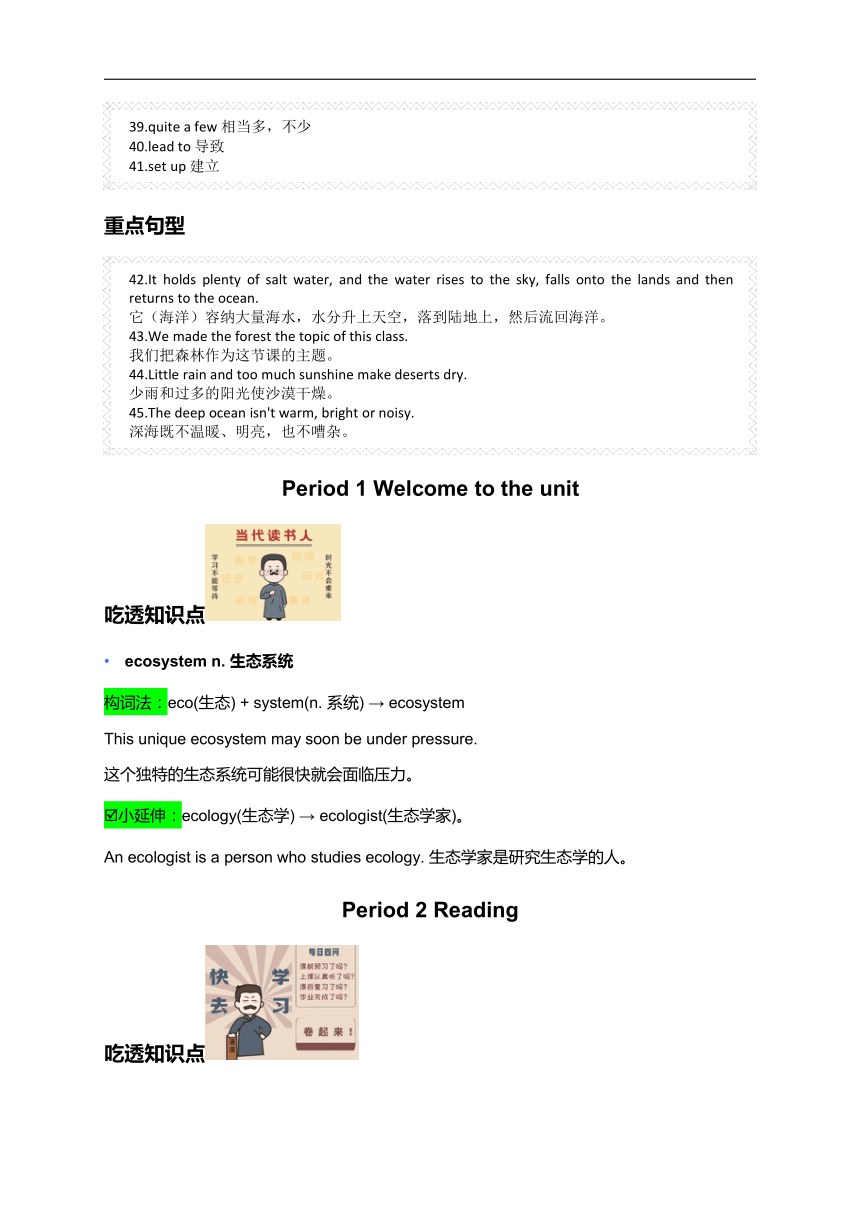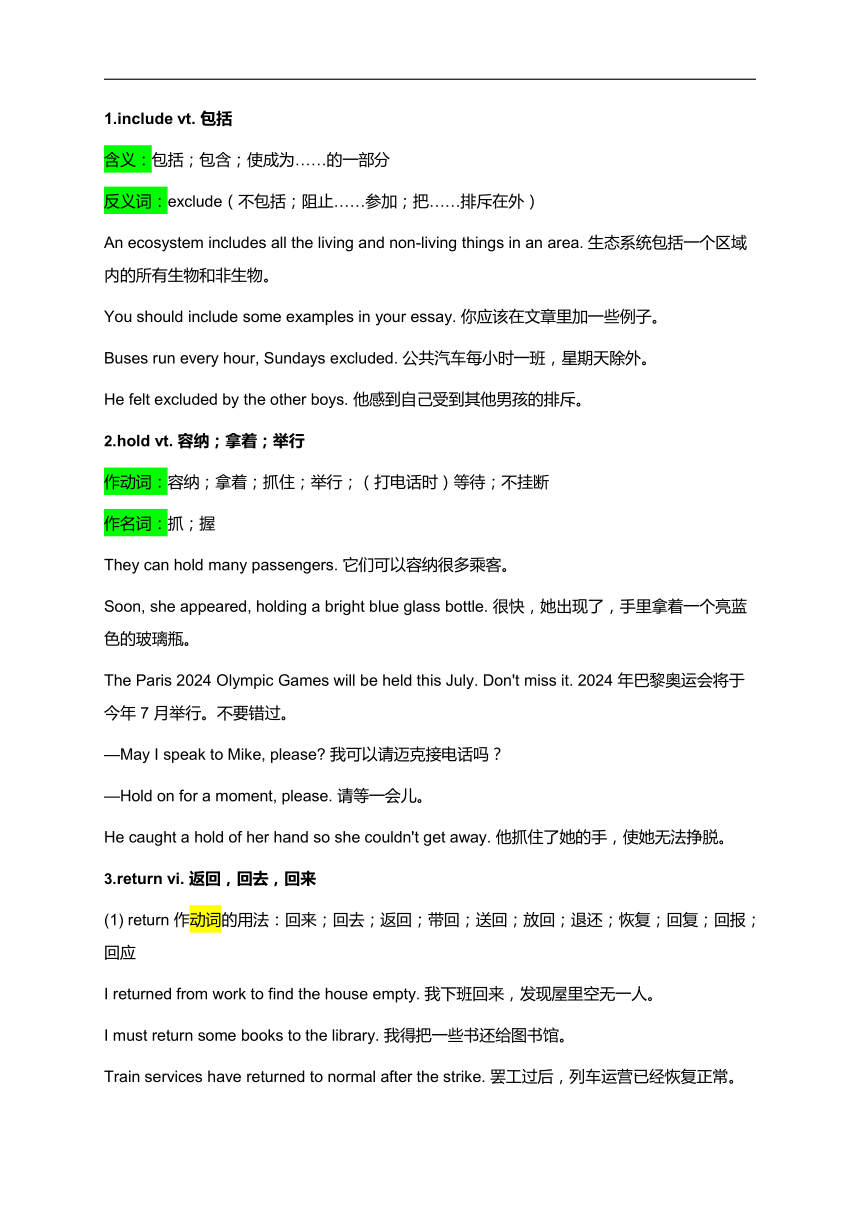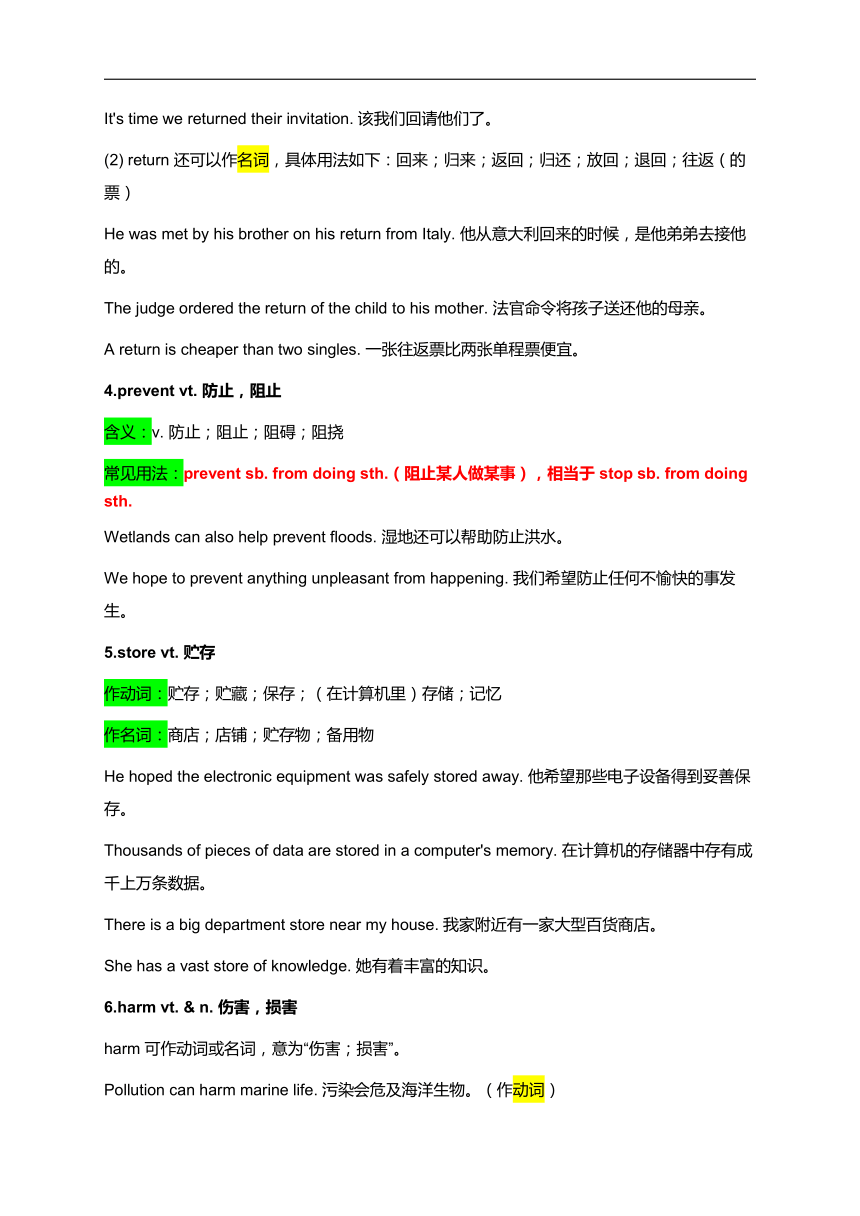Unit 7 The natural world重点知识清单译林版(2024)八年级英语上册
文档属性
| 名称 | Unit 7 The natural world重点知识清单译林版(2024)八年级英语上册 |  | |
| 格式 | docx | ||
| 文件大小 | 194.6KB | ||
| 资源类型 | 教案 | ||
| 版本资源 | 译林版 | ||
| 科目 | 英语 | ||
| 更新时间 | 2025-08-20 16:02:24 | ||
图片预览




文档简介
8A Unit 7 The natural world重点知识
单元主题内容框架
能听懂介绍不同生态系统的音频材料
能口头介绍不同生态系统的特征
能读懂关于生态系统及环境保护的文章
能以书面形式介绍如何保护自然环境
重点单词
1.penguin n. 企鹅
2.climate n. 气候
3.include vt. 包括
4.around adv. 大约
5.hold vt. 容纳;拿着;举行
6.return vi. 返回,回去,回来
7.store vt. 贮存
8.act vi. 起作用;行动 vt. & vi. 扮演
9.therefore adv. 因此
10.sadly adv. 不幸地;悲伤地
11.ton n. 吨
12.harm vt. & n. 伤害,损害
13.wildlife n. 野生动物
14.noisy adj. 充满噪声的;吵闹的
15.system n. 系统;体系
16.cause vt. 使发生,造成,导致;n. 原因;理由
17.damage vt. 损害,毁坏;n. 损坏,损失;损害
18.north-east n., adj. & adv. 东北;东北方的;向东北方
19.cover n. 躲避处;罩子
20.lead vt. 造成(后果)
21.create vt. 创建,创造
22.balanced adj. 保持平衡的
23.project n. 项目
24.knowledge n. 知识
25.sir n. 先生
26.madam n. 女士
27.kill vt. & vi. 杀死
28.solve vt. 解决;解答
29.environmental adj. 环境的
词形变化
30.act v. → action n. 行动;行为
31.sadly adv. → sad adj. 悲哀的;难过的
32.harm vt. & n. → harmful adj. 有害的 → harmless adj. 无害的
33.noisy adj. → noise n. 声音;噪音
34.lead vi. → leader n. 领导者;领袖
35.create vt. → creator n. 创造者;创作者 → creation n. 创造;作品 → creative adj. 有创造力的
重点短语
36.so... that... 如此……以至于……
37.be of different sizes 大小不同
38.get rid of 清除;摆脱
39.quite a few 相当多,不少
40.lead to 导致
41.set up 建立
重点句型
42.It holds plenty of salt water, and the water rises to the sky, falls onto the lands and then returns to the ocean.
它(海洋)容纳大量海水,水分升上天空,落到陆地上,然后流回海洋。
43.We made the forest the topic of this class.
我们把森林作为这节课的主题。
44.Little rain and too much sunshine make deserts dry.
少雨和过多的阳光使沙漠干燥。
45.The deep ocean isn't warm, bright or noisy.
深海既不温暖、明亮,也不嘈杂。
Period 1 Welcome to the unit
吃透知识点
ecosystem n. 生态系统
构词法:eco(生态) + system(n. 系统) → ecosystem
This unique ecosystem may soon be under pressure.
这个独特的生态系统可能很快就会面临压力。
小延伸:ecology(生态学) → ecologist(生态学家)。
An ecologist is a person who studies ecology. 生态学家是研究生态学的人。
Period 2 Reading
吃透知识点
1.include vt. 包括
含义:包括;包含;使成为……的一部分
反义词:exclude(不包括;阻止……参加;把……排斥在外)
An ecosystem includes all the living and non-living things in an area. 生态系统包括一个区域内的所有生物和非生物。
You should include some examples in your essay. 你应该在文章里加一些例子。
Buses run every hour, Sundays excluded. 公共汽车每小时一班,星期天除外。
He felt excluded by the other boys. 他感到自己受到其他男孩的排斥。
2.hold vt. 容纳;拿着;举行
作动词:容纳;拿着;抓住;举行;(打电话时)等待;不挂断
作名词:抓;握
They can hold many passengers. 它们可以容纳很多乘客。
Soon, she appeared, holding a bright blue glass bottle. 很快,她出现了,手里拿着一个亮蓝色的玻璃瓶。
The Paris 2024 Olympic Games will be held this July. Don't miss it. 2024 年巴黎奥运会将于今年 7 月举行。不要错过。
—May I speak to Mike, please 我可以请迈克接电话吗?
—Hold on for a moment, please. 请等一会儿。
He caught a hold of her hand so she couldn't get away. 他抓住了她的手,使她无法挣脱。
3.return vi. 返回,回去,回来
(1) return 作动词的用法:回来;回去;返回;带回;送回;放回;退还;恢复;回复;回报;回应
I returned from work to find the house empty. 我下班回来,发现屋里空无一人。
I must return some books to the library. 我得把一些书还给图书馆。
Train services have returned to normal after the strike. 罢工过后,列车运营已经恢复正常。
It's time we returned their invitation. 该我们回请他们了。
(2) return 还可以作名词,具体用法如下:回来;归来;返回;归还;放回;退回;往返(的票)
He was met by his brother on his return from Italy. 他从意大利回来的时候,是他弟弟去接他的。
The judge ordered the return of the child to his mother. 法官命令将孩子送还他的母亲。
A return is cheaper than two singles. 一张往返票比两张单程票便宜。
4.prevent vt. 防止,阻止
含义:v. 防止;阻止;阻碍;阻挠
常见用法:prevent sb. from doing sth.(阻止某人做某事),相当于 stop sb. from doing sth.
Wetlands can also help prevent floods. 湿地还可以帮助防止洪水。
We hope to prevent anything unpleasant from happening. 我们希望防止任何不愉快的事发生。
5.store vt. 贮存
作动词:贮存;贮藏;保存;(在计算机里)存储;记忆
作名词:商店;店铺;贮存物;备用物
He hoped the electronic equipment was safely stored away. 他希望那些电子设备得到妥善保存。
Thousands of pieces of data are stored in a computer's memory. 在计算机的存储器中存有成千上万条数据。
There is a big department store near my house. 我家附近有一家大型百货商店。
She has a vast store of knowledge. 她有着丰富的知识。
6.harm vt. & n. 伤害,损害
harm 可作动词或名词,意为“伤害;损害”。
Pollution can harm marine life. 污染会危及海洋生物。(作动词)
He would never frighten anyone or cause them any harm. 他永远不会吓唬或伤害任何人。(作名词)
He may look fierce, but he means no harm. 他可能看上去很凶,但并无恶意。(作名词)
The loss will do serious harm to my business. 这次损失将严重损害我的生意。(作名词)
小延伸:harmful adj.(尤指对健康或环境)有害的;harmless adj. 无害的;无恶意的
Fruit juices can be harmful to children's teeth. 果汁可能损坏儿童的牙齿。
It's just a bit of harmless fun. 开个小玩笑罢了,并无恶意的。
Period 3 Grammar & Word power
吃透知识点
构词法⑦:后缀 -ly
(1) 在某些形容词后加 -ly 可构成副词。如:real → really;easy → easily;careful → carefully。
(2) 在某些名词后加 -ly 可构成形容词。如:friend → friendly;week → weekly。
(3) 在某些形容词后加 -ly 可构成新的形容词。如:kind → kindly;live → lively。
吃透语法
简单句的基本句型(Ⅱ)
(一)主语 + 谓语 + 宾语 + 宾语(S + V + O + O)
a.在“S + V + O + O”结构的简单句中,第一个宾语为间接宾语,第二个宾语为直接宾语。
b.两个宾语通常可以互换位置,当直接宾语在间接宾语之前,此时在间接宾语前要加介词 to 或 for。
The sun gives ocean animals light and heat. = The sun gives light and heat to ocean animals. 太阳给海洋动物光和热。
We should build local wildlife a better home. = We should build a better home for local wildlife. 我们应该为当地野生动物建立一个更好的家园。
(二)主语 + 谓语 + 宾语 + 宾语补足语(S + V + O + C)
在此结构的简单句中,宾语补足语常用来补充说明该宾语的行为或状态等。
The teacher made us laugh. 老师让我们笑起来。
Don't let her upset you. 别让她搅得你心烦。
注意:当动词不定式短语在使役动词 make 后作宾语补足语时,要省略 to。
并列连词 and、but、or 和 so
连词 用法
and 意为“和;又”,表示并列关系,可用来连接两个并列的单词、短语或分句;在“祈使句 + and + 陈述句”句型中,祈使句部分表示条件,陈述句部分通常表示较好的结果
but 意为“但是”,表示转折关系,所连接成分的意思往往相反或相对
or 意为“或者;还是”,表示选择关系;在“祈使句 + or + 陈述句”句型中,or 意为“否则;要不然”,祈使句部分表示条件,陈述句部分通常表示不理想的结果
so 意为“因此;所以”,表示因果关系
Our English teacher is kind and helpful. 我们的英语老师既和蔼可亲又乐于助人。
Be careful, and you will make fewer mistakes. 仔细点儿,你犯的错误就会更少。
Our school is small but beautiful. 我们的学校很小但是很漂亮。
The car is very old but it runs very fast. 虽然这辆小汽车很旧了,但它跑得很快。
I can't speak English or French. 我不会说英语,也不会说法语。
Don't drive so fast, or you'll have a car accident. 别开那么快,不然你会出车祸。
The rain began to fall, so we went home. 开始下雨了,所以我们就回家了。
Period 4 Integration
吃透知识点
1.“介词 + 方位词”结构
表示方位的词常与介词 in、on 或 to 连用,用来表示两个地点的相对位置:一地在另一地内,用 in;两地接壤,用 on;一地在另一地外且两地不相邻,用 to。
介词 区别 示例
in “在…范围”之内 China is in the east of Asia.
on A与B接壤不管辖 Guangdong Province is on the southeast of Guangxi.
to A与B既不接壤也不管辖 Japan is to the east of China.
Zhalong Nature Reserve is in Heilongjiang Province in the north-east of China. 扎龙自然保护区位于中国东北部的黑龙江省。(在内部)
Henan Province is on the south of Hebei Province. 河南省在河北省的南部。(两地接壤)
Japan is to the east of China. 日本在中国的东部。(两地不相邻)
2.cover n. 躲避处;罩子
(1) cover 作名词时,意为“覆盖物;封面;庇护所”。
The area provides food and cover for a lot of wildlife. 该地区为许多野生动物提供食物和庇护所。
An armadillo has a hard cover that can protect it from other dangerous animals. 犰狳有一个坚硬的外壳,可以保护它免受其他危险动物的伤害。
Her face was on the cover of most magazines. 大多数杂志的封面都有她的面孔。
(2) cover 还可作动词,其用法如下:报道;电视报道(后接名词或代词作宾语);包含;涉及;遮盖;覆盖(cover A with B 用 B 把 A 盖住);占(一片面积)
This year's Beijing Music Awards will be covered live this Saturday. 今年的北京音乐奖将于本周六进行现场直播。
They covered many topics, including animals, flowers and things about Chinese history. 它们涵盖了许多主题,包括动物、花卉和有关中国历史的东西。
Cover the burnt area with a clean cloth. 用一块干净的布覆盖烧伤部位。
Tiger Hill covers an area of about 14,100 square metres and is 34.3 metres high. 虎丘山占地大约 14100 平方米,高 34.3 米。
3.environmental adj. 环境的
构词法:environment(n. 环境) + -al(形容词后缀) → environmental
She cares deeply about environmental issues. 她对环境问题深感担忧。
单元主题内容框架
能听懂介绍不同生态系统的音频材料
能口头介绍不同生态系统的特征
能读懂关于生态系统及环境保护的文章
能以书面形式介绍如何保护自然环境
重点单词
1.penguin n. 企鹅
2.climate n. 气候
3.include vt. 包括
4.around adv. 大约
5.hold vt. 容纳;拿着;举行
6.return vi. 返回,回去,回来
7.store vt. 贮存
8.act vi. 起作用;行动 vt. & vi. 扮演
9.therefore adv. 因此
10.sadly adv. 不幸地;悲伤地
11.ton n. 吨
12.harm vt. & n. 伤害,损害
13.wildlife n. 野生动物
14.noisy adj. 充满噪声的;吵闹的
15.system n. 系统;体系
16.cause vt. 使发生,造成,导致;n. 原因;理由
17.damage vt. 损害,毁坏;n. 损坏,损失;损害
18.north-east n., adj. & adv. 东北;东北方的;向东北方
19.cover n. 躲避处;罩子
20.lead vt. 造成(后果)
21.create vt. 创建,创造
22.balanced adj. 保持平衡的
23.project n. 项目
24.knowledge n. 知识
25.sir n. 先生
26.madam n. 女士
27.kill vt. & vi. 杀死
28.solve vt. 解决;解答
29.environmental adj. 环境的
词形变化
30.act v. → action n. 行动;行为
31.sadly adv. → sad adj. 悲哀的;难过的
32.harm vt. & n. → harmful adj. 有害的 → harmless adj. 无害的
33.noisy adj. → noise n. 声音;噪音
34.lead vi. → leader n. 领导者;领袖
35.create vt. → creator n. 创造者;创作者 → creation n. 创造;作品 → creative adj. 有创造力的
重点短语
36.so... that... 如此……以至于……
37.be of different sizes 大小不同
38.get rid of 清除;摆脱
39.quite a few 相当多,不少
40.lead to 导致
41.set up 建立
重点句型
42.It holds plenty of salt water, and the water rises to the sky, falls onto the lands and then returns to the ocean.
它(海洋)容纳大量海水,水分升上天空,落到陆地上,然后流回海洋。
43.We made the forest the topic of this class.
我们把森林作为这节课的主题。
44.Little rain and too much sunshine make deserts dry.
少雨和过多的阳光使沙漠干燥。
45.The deep ocean isn't warm, bright or noisy.
深海既不温暖、明亮,也不嘈杂。
Period 1 Welcome to the unit
吃透知识点
ecosystem n. 生态系统
构词法:eco(生态) + system(n. 系统) → ecosystem
This unique ecosystem may soon be under pressure.
这个独特的生态系统可能很快就会面临压力。
小延伸:ecology(生态学) → ecologist(生态学家)。
An ecologist is a person who studies ecology. 生态学家是研究生态学的人。
Period 2 Reading
吃透知识点
1.include vt. 包括
含义:包括;包含;使成为……的一部分
反义词:exclude(不包括;阻止……参加;把……排斥在外)
An ecosystem includes all the living and non-living things in an area. 生态系统包括一个区域内的所有生物和非生物。
You should include some examples in your essay. 你应该在文章里加一些例子。
Buses run every hour, Sundays excluded. 公共汽车每小时一班,星期天除外。
He felt excluded by the other boys. 他感到自己受到其他男孩的排斥。
2.hold vt. 容纳;拿着;举行
作动词:容纳;拿着;抓住;举行;(打电话时)等待;不挂断
作名词:抓;握
They can hold many passengers. 它们可以容纳很多乘客。
Soon, she appeared, holding a bright blue glass bottle. 很快,她出现了,手里拿着一个亮蓝色的玻璃瓶。
The Paris 2024 Olympic Games will be held this July. Don't miss it. 2024 年巴黎奥运会将于今年 7 月举行。不要错过。
—May I speak to Mike, please 我可以请迈克接电话吗?
—Hold on for a moment, please. 请等一会儿。
He caught a hold of her hand so she couldn't get away. 他抓住了她的手,使她无法挣脱。
3.return vi. 返回,回去,回来
(1) return 作动词的用法:回来;回去;返回;带回;送回;放回;退还;恢复;回复;回报;回应
I returned from work to find the house empty. 我下班回来,发现屋里空无一人。
I must return some books to the library. 我得把一些书还给图书馆。
Train services have returned to normal after the strike. 罢工过后,列车运营已经恢复正常。
It's time we returned their invitation. 该我们回请他们了。
(2) return 还可以作名词,具体用法如下:回来;归来;返回;归还;放回;退回;往返(的票)
He was met by his brother on his return from Italy. 他从意大利回来的时候,是他弟弟去接他的。
The judge ordered the return of the child to his mother. 法官命令将孩子送还他的母亲。
A return is cheaper than two singles. 一张往返票比两张单程票便宜。
4.prevent vt. 防止,阻止
含义:v. 防止;阻止;阻碍;阻挠
常见用法:prevent sb. from doing sth.(阻止某人做某事),相当于 stop sb. from doing sth.
Wetlands can also help prevent floods. 湿地还可以帮助防止洪水。
We hope to prevent anything unpleasant from happening. 我们希望防止任何不愉快的事发生。
5.store vt. 贮存
作动词:贮存;贮藏;保存;(在计算机里)存储;记忆
作名词:商店;店铺;贮存物;备用物
He hoped the electronic equipment was safely stored away. 他希望那些电子设备得到妥善保存。
Thousands of pieces of data are stored in a computer's memory. 在计算机的存储器中存有成千上万条数据。
There is a big department store near my house. 我家附近有一家大型百货商店。
She has a vast store of knowledge. 她有着丰富的知识。
6.harm vt. & n. 伤害,损害
harm 可作动词或名词,意为“伤害;损害”。
Pollution can harm marine life. 污染会危及海洋生物。(作动词)
He would never frighten anyone or cause them any harm. 他永远不会吓唬或伤害任何人。(作名词)
He may look fierce, but he means no harm. 他可能看上去很凶,但并无恶意。(作名词)
The loss will do serious harm to my business. 这次损失将严重损害我的生意。(作名词)
小延伸:harmful adj.(尤指对健康或环境)有害的;harmless adj. 无害的;无恶意的
Fruit juices can be harmful to children's teeth. 果汁可能损坏儿童的牙齿。
It's just a bit of harmless fun. 开个小玩笑罢了,并无恶意的。
Period 3 Grammar & Word power
吃透知识点
构词法⑦:后缀 -ly
(1) 在某些形容词后加 -ly 可构成副词。如:real → really;easy → easily;careful → carefully。
(2) 在某些名词后加 -ly 可构成形容词。如:friend → friendly;week → weekly。
(3) 在某些形容词后加 -ly 可构成新的形容词。如:kind → kindly;live → lively。
吃透语法
简单句的基本句型(Ⅱ)
(一)主语 + 谓语 + 宾语 + 宾语(S + V + O + O)
a.在“S + V + O + O”结构的简单句中,第一个宾语为间接宾语,第二个宾语为直接宾语。
b.两个宾语通常可以互换位置,当直接宾语在间接宾语之前,此时在间接宾语前要加介词 to 或 for。
The sun gives ocean animals light and heat. = The sun gives light and heat to ocean animals. 太阳给海洋动物光和热。
We should build local wildlife a better home. = We should build a better home for local wildlife. 我们应该为当地野生动物建立一个更好的家园。
(二)主语 + 谓语 + 宾语 + 宾语补足语(S + V + O + C)
在此结构的简单句中,宾语补足语常用来补充说明该宾语的行为或状态等。
The teacher made us laugh. 老师让我们笑起来。
Don't let her upset you. 别让她搅得你心烦。
注意:当动词不定式短语在使役动词 make 后作宾语补足语时,要省略 to。
并列连词 and、but、or 和 so
连词 用法
and 意为“和;又”,表示并列关系,可用来连接两个并列的单词、短语或分句;在“祈使句 + and + 陈述句”句型中,祈使句部分表示条件,陈述句部分通常表示较好的结果
but 意为“但是”,表示转折关系,所连接成分的意思往往相反或相对
or 意为“或者;还是”,表示选择关系;在“祈使句 + or + 陈述句”句型中,or 意为“否则;要不然”,祈使句部分表示条件,陈述句部分通常表示不理想的结果
so 意为“因此;所以”,表示因果关系
Our English teacher is kind and helpful. 我们的英语老师既和蔼可亲又乐于助人。
Be careful, and you will make fewer mistakes. 仔细点儿,你犯的错误就会更少。
Our school is small but beautiful. 我们的学校很小但是很漂亮。
The car is very old but it runs very fast. 虽然这辆小汽车很旧了,但它跑得很快。
I can't speak English or French. 我不会说英语,也不会说法语。
Don't drive so fast, or you'll have a car accident. 别开那么快,不然你会出车祸。
The rain began to fall, so we went home. 开始下雨了,所以我们就回家了。
Period 4 Integration
吃透知识点
1.“介词 + 方位词”结构
表示方位的词常与介词 in、on 或 to 连用,用来表示两个地点的相对位置:一地在另一地内,用 in;两地接壤,用 on;一地在另一地外且两地不相邻,用 to。
介词 区别 示例
in “在…范围”之内 China is in the east of Asia.
on A与B接壤不管辖 Guangdong Province is on the southeast of Guangxi.
to A与B既不接壤也不管辖 Japan is to the east of China.
Zhalong Nature Reserve is in Heilongjiang Province in the north-east of China. 扎龙自然保护区位于中国东北部的黑龙江省。(在内部)
Henan Province is on the south of Hebei Province. 河南省在河北省的南部。(两地接壤)
Japan is to the east of China. 日本在中国的东部。(两地不相邻)
2.cover n. 躲避处;罩子
(1) cover 作名词时,意为“覆盖物;封面;庇护所”。
The area provides food and cover for a lot of wildlife. 该地区为许多野生动物提供食物和庇护所。
An armadillo has a hard cover that can protect it from other dangerous animals. 犰狳有一个坚硬的外壳,可以保护它免受其他危险动物的伤害。
Her face was on the cover of most magazines. 大多数杂志的封面都有她的面孔。
(2) cover 还可作动词,其用法如下:报道;电视报道(后接名词或代词作宾语);包含;涉及;遮盖;覆盖(cover A with B 用 B 把 A 盖住);占(一片面积)
This year's Beijing Music Awards will be covered live this Saturday. 今年的北京音乐奖将于本周六进行现场直播。
They covered many topics, including animals, flowers and things about Chinese history. 它们涵盖了许多主题,包括动物、花卉和有关中国历史的东西。
Cover the burnt area with a clean cloth. 用一块干净的布覆盖烧伤部位。
Tiger Hill covers an area of about 14,100 square metres and is 34.3 metres high. 虎丘山占地大约 14100 平方米,高 34.3 米。
3.environmental adj. 环境的
构词法:environment(n. 环境) + -al(形容词后缀) → environmental
She cares deeply about environmental issues. 她对环境问题深感担忧。
同课章节目录
